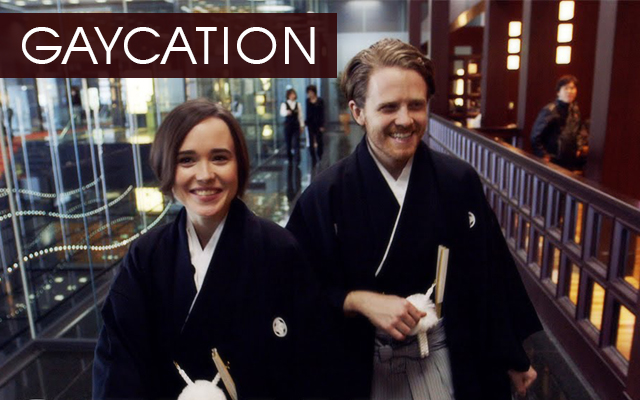For the inaugural episode of docu-series Gaycation, Ellen Page and her best friend Ian Daniel travel to Japan to explore the still largely underground gay scene in Tokyo and Kyoto. The series aims to educate on and explore LGBTQ culture around the globe. The episode, while voicing the occasional unpleasant truths of gay Japanese culture, still manages to end on a hopeful note.
Ellen and Ian first travel to Tokyo and explore a variety of bars in the gay district: Tokyo’s oldest (and smallest!) gay bar, a lesbian bar that started out as a ‘women only’ club, and an invite-only club behind a nondescript door where men can choose from a variety of costumes to dress and act like a woman. In just five city blocks, these three of over 300 bars offer only a sliver of what is available to experience in Tokyo’s gay culture: brightly splashed across the screen are packed, ear-splittingly-loud club scenes, replete with strobe lights, leather, costume, and the dense fog of cigarette smoke; it looks like a hell of a party.
They also visit an 8-floor manga store, where they seek out the yaoi (“boy love”) section and talk to a couple of women (known as ‘Rotten Women’) about their very enthusiastic interest in gay male erotic fiction. “Homosexuality exists and it is beautiful,” one of them states as everyone settles into a soundproof karaoke booth to listen to an extremely graphic yaoi audiobook. The whole idea behind the audiobooks is that, to them, it’s like ‘walking in’ on a taboo act; they love the feeling of embarrassment that comes along with ‘discovering’ two men in the throes of passion. A somber cloud, however, hangs over the group as one of the women explains that, while she has many gay friends, most of them do not like yaoi and say that it does not reflect gay Japanese culture at all: “It’s actually quite bleak and not accepted society.”
Later, they travel to Kyoto, where one of the oldest Buddhist temples in the region offers gender-inclusive wedding ceremonies. Gay civil unions are not recognized legally, of course, but it begs the obvious question: if religion is not a barrier to acceptance of gay culture in Japan, what is? The answer is complex and combines a mixture of Japan’s culture of shame, a widely-accepted “don’t ask, don’t tell” mentality, and the slow-to-change acceptance of out gay people. Many men choose to enter into marriages of convenience in order to hide their sexuality from their families; one man, Mr. X (anonymous at his request) explains that he has a wife, but they live more as roommates than as a couple. He will not date men who do not understand what he is going through, and who are not supportive of his faux-marriage. Unfortunately, this is the norm for many gay men in Japan; sometimes coming out is simply not an option.
Coming out in Japan is complex, and many gay people find that they (understandably) simply cannot face their family alone—I know I couldn’t, and I had my best friend with me when I did. Mr. Ishii in Kyoto owns a company that essentially provides a wide variety of people you can rent to pad weddings, parties, and anything else that might require anywhere from one to a few dozen extra ‘friends’. Recently, gay people have been contacting him to accompany them while they come out to their families. In an interesting twist, Ellen and Ian are asked by a client of Mr. Ishii’s to go with him—along with Mr. Ishii himself—while he comes out to his mother.
Coming out is an extremely private affair; Ellen and Ian seem reluctant and slightly uncomfortable being in such close quarters at this crucial moment in the young man’s life. The doorbell chimes, and his single mother enters the room. After introductions, the young man comes out to his mother, and the silence afterward is deafening. The boy’s mother calmly says, “I’m sorry. I can’t do this,” and stands up and leaves, and seeing the heartbreak on the boy’s face is devastating. Mr. Ishii goes after her, leaving Ellen, Ian, and the young man alone. Several long minutes later, the mother and Mr. Ishii come back inside, and she apologized for leaving. “I’m sure society will treat you differently, but I still wish you the best,” she says over the sound of my quiet sobbing as her and her son share small smiles.
On April 1st, 2015, the Shibuya ward of Tokyo became the first in Japan to recognize civil unions for same-sex couples. It’s a small step, but a step in the right direction, and also towards an increasingly bright future for gay people living in Japan. Gaycation is definitely worth the watch, if not for the travel, at least for the idea that, someday, society will catch up to us.


